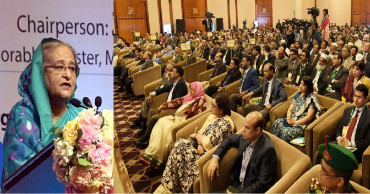leprosy
Bangladesh has 5th highest number of leprosy cases in the world
The situation of persons affected by leprosy in Bangladesh indicates that the country’s outstanding economic growth is not reaching the entire population, a UN expert said today (February 15, 2023).
She called for draft anti-discrimination laws to formally recognise leprosy, also known as Hansen’s disease, as a prohibited ground of discrimination.
“Leprosy is hidden beneath multiple layers of systemic exclusion, structural discrimination and institutional neglect,” UN Special Rapporteur on the elimination of discrimination against persons affected by leprosy and their family members, Alice Cruz, said in a statement at the end of an eight-day visit to Bangladesh.
Bangladesh has the fifth highest number of leprosy cases in the world, according to the World Health Organisation (WHO), with relevant data indicating ongoing transmission, late diagnosis, and gaps in the health system.
Also read: UN leprosy expert to visit Bangladesh
“While I commend the Prime Minister’s commitment to eliminate leprosy by 2030, I am concerned that the state administration is failing to implement this promise,” the UN special rapporteur said.
“Adequate budget allocation with clear targets, indicators and benchmarks is essential to turn the government’s pledges into reality,” Cruz said.
The UN expert expressed deep concerns about a high potential number of hidden leprosy cases, critically delayed diagnosis, ongoing transmission and disability among children and widespread disease-related discrimination and stigmatisation.
She also highlighted limited access to care for those affected – including rehabilitation, reconstructive surgery, assistive devices and psychosocial support.
Also Read: Leprosy still infects 4000 people every year in Bangladesh
Cruz deplored the data gap and limited understanding of leprosy among the relevant authorities.
“Fundamental principles of the right to development, such as equity, self-determination, participation and justice are not being met,” the UN special rapporteur said.
“Persons affected by leprosy and their families are still not enjoying the benefits of economic growth, nor are they seeing discrimination against them duly redressed,” she said.
The expert expressed concerns about reports on corruption with regard to access to disability-related benefits and other social protection schemes, limited efficiency of oversight institutions and essentially paternalistic approaches to people living in vulnerable situations.
Read More: Karkuma Immune Plus boosts type-2 diabetic patients' immunity by 27percent: DU-BIRDEM study
She noted that the government of Bangladesh was committed to actively engaging with the international human rights system to protect the fundamental rights of persons affected by leprosy.
During her visit, Cruz met members of the government, representatives of civil society organisations, healthcare workers, and persons affected by leprosy. She visited healthcare facilities and communities affected by leprosy in Nilphamari and Bogura.
The UN special rapporteur will present her report on the visit to the Human Rights Council in June 2023.
Read More: Bangladesh built fast response capabilities for influenza, other respiratory infection using lessons learned from Covid-19: WHO
3 years ago
Covid-19 in Bangladesh: '76% leprosy-affected people face severe financial crisis'
Around 76% of people affected by leprosy (PAL) in Bangladesh are facing a severe financial crisis during the Covid-19 pandemic, according to a study by The Leprosy Mission International Bangladesh (TLMIB).
The finding was disclosed at a workshop on "Leprosy Research Dissemination" in Dhaka Sunday, jointly arranged by National Leprosy Program (NLP) and TLMIB.
The study titled "An assessment of Covid-19 impact on persons affected by leprosy in Bangladesh" was conducted by TLMIB which was funded by the Norwegian Agency for Exchange Cooperation (Norec).
Professor Dr Md Shamiul Islam, director of micro bacterial disease control (MBDC) at the Directorate General of Health Services (DGHS), presided over the meeting. Dr Md Enamul Haque, deputy director of MBDC and manager of NLP, attended it as the chief guest.
READ: Leprosy still infects 4000 people every year in Bangladesh
A research team under the leadership of Jiptha Boiragee, programme support coordinator of TLMIB, conducted the research during March-August this year.
The research findings presented by Roton Malo, project officer of TLMIB, shows that 26% of leprosy-affected persons had no source of income during the pandemic.
Meanwhile, 47.85% of PAL had no income source for 1 to 10 months during the pandemic. Only 26.27% of PAL had a regular working opportunity for survival.
Also, 46.61% of families of persons affected by leprosy faced food shortage during the pandemic while eight out of 255 respondents (51% men and 49% women) said they married off their under-aged girls to cut family expenses.
The study conducted in 17 districts from all eight divisions also reveals that 89.8% of people affected by leprosy could not go to hospitals for needed leprosy-related services due to movement restrictions.
Also, 35.62% of PAL with leprosy-related ulcer stayed home without services during the pandemic; 23.62% PAL received ulcer care at government hospitals, Roton said while presenting the findings.
READ: 85pc Bangladeshi leprosy disabled people psychologically ill: Study
In addition, until July 2021, no leprosy patient in Bangladesh was vaccinated while 43% of PAL disagreed to be vaccinated and 42% of family members of PAL said their PAL member "does not need to be vaccinated."
Discussants at the research dissemination event emphasised mass awareness programmes by NLP, partnering organisations to motivate PAL and their family members to get vaccinated to be safe from Covid infections.
Also, the study found 27% of persons affected by leprosy having major depression while 5% were living with minor depression and the well-being status of 49% PAL started to reduce.
The TLMIB research team used the WHO-5 Well-being Index to examine the mental health status of PAL.
At the event, Dr Samiul Islam directed the programme manager of NLP and other officials to take necessary steps to ensure smooth services for people affected by leprosy in Bangladesh.
Researchers of TLMIB also disclosed findings of two more medical research titled "Effectiveness of single-dose rifampicin after BCG vaccination to prevent leprosy in close contacts of patients with newly diagnosed leprosy: A cluster randomised controlled trial," and "Patients with skin smear positive leprosy in Bangladesh are the main risk factor for leprosy development: 21-year follow-up in the household contact study (COCOA)."
Dr Abu Sufian Chowdhury, research coordinator of TLMIB, and Md Khorshed Alam, project manager of TLMIB, presented the findings of two medical studies.
Salomon Sumon Halder, country director of TLMIB; Dr Md Shafiqul Islam, former deputy director MBDC and programme manager of NLP; Dr Safir Uddin Ahmed, Dr Sheikh Abdul Hadi, ex-DPM, Leprosy; Dr Nayma Haque, DPM and coordinator, Leprosy; Dr Sabera Sultana, national professional officer, NTD at the World Health Organization; Dr Adnan Rassel, DPM, training and logistics; Dr Md Sohel Rana, assistant director, leprosy; Dr Shahed Hossain, consultant scientist of the (International Centre for Diarrhoeal Disease Research, Bangladesh (icddrb) were also present at the event.
4 years ago
Leprosy still infects 4000 people every year in Bangladesh
About 4,000 fresh leprosy cases are being detected every year in Bangladesh and almost eight percent of the patients suffer from leprosy-related disability, according to a document from Leprosy & TB Coordinating Committee (LTCC) on ‘World Leprosy Day-2021’.
5 years ago
Leprosy can transmit within households to a lesser extent: Study
A Contact Cohorts Analysis (COCOA) study, conducted in four districts of northwestern Bangladesh, found that leprosy can transmit from an infected person to another who shares the same home albeit to a lesser extent.
5 years ago
Shun negative attitudes towards leprosy patients: PM
Prime Minister Sheikh Hasina on Wednesday urged everyone to shun negative attitudes and stop isolating leprosy patients and instead take initiatives for their proper treatment.
6 years ago

.jpg)
.jpg)



